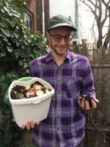Original article found here: http://www.mpnnow.com/news/20161128/naples-area-compost-operation-growing-and-thriving
A small backyard compost turned into a rich farming operation in Prattsburgh that is keeping Naples-area food waste out of the landfill
Al Zappetella makes weekly rounds through Naples to pick up buckets of kitchen scraps. Barrels of discarded onion skins, banana peels, coffee grounds, egg shells, apple cores and other food waste — along with leaves, yard trimmings and other organic waste — get trucked a few miles down the road to Prattsburgh.
Zappetella has been doing the free pickups for a few years now. That is, after he and partner Celeste Arlie realized they were outgrowing their small, backyard compost pile in Naples. Family, friends and neighbors began adding to the pile. It cut everyone’s household waste by more than half.
Then, as Arlie posted on the Facebook page set up to get the word out, they went bigger: “In an effort to make the world a little bit greener we wanted to bring composting to our community.”
Now, at their farm on Route 53 in Prattsburgh, where Zappetella brings the weekly haul from 12 households and several Naples businesses, the compost operation is thriving. Food scrap pickups include from the local grocery store, Rennoldson’s Market, and restaurants such as Roots Cafe and The Grainery among other stops. Prattsburgh Central School is also on board, and Zappetella hopes the Naples school district will join, too.
From inside the barn, Zappetella shows a number of 32-square-foot beds, where the compost soil is in various stages of development. He started about four years ago with 2 pounds of worms. They multiply like crazy, he said. The worms recycle the food scraps and other organic material by eating the scraps, which become compost as they pass through the worm’s body. Compost exits the worm through its tail end — basically, it’s the worm poo that does it, Zappetella said, pulling up a fistful of the rich mix.
Outside the barn, Zappetella pointed to the surrounding undeveloped hillsides from the family farm that runs on both sides of Route 53. “We want to use all the resources,” he said. A few of the farm’s 30 or so chickens pecked at a fresh pile of food scraps — it’s OK that meat and bones are in the scraps because the chickens eat it, he said. With help from his sons and other family, Zappetella said they are able to keep the place going and look to grow.
In all, along with the chickens, they have 14 goats and 7 Icelandic sheep that all live under the watchful eye of Loli, an Anatolian shepherd who guards the place. “She’s fearless,” said Zappetella. Before they got her, he noted, bears raided the farm and broke into their beehives.
Four of the 20 acres are fenced in, and a new barn is going up across the field. Eventually, they would like to open a roadside stand to sell their goat-milk products and other farm produce.
The compost makes rich fertilizer for growing their fruits and vegetables and they sell “16th-inch fine-sifted worm castings,” he said.
With nearly half of all the waste that lands in landfills from food and other organic material, the push is on put it to use. Ontario County is behind the effort, with its move to reduce landfill waste by at least 60 percent within the next nine years. The contract with landfill manager Casella Waste Systems Inc. expires in 2028, when many say they want the county to shut down the facility in the town of Seneca. A big part of the effort involves the county and its municipalities and businesses working together, while individuals also take the lead.
“Waste is a lack of imagination,” said Keith Turner of Canandaigua, quoting the owner of a local worm farm. Keith and his wife, Sue, collect coffee grounds from Finger Lakes Coffee Roasters in Farmington for compost.
“So this is trying to have an imagination,” Keith said.
/////////////////////////////////////////////////////////////////////////////////////////////
I couldn’t have said it better myself. Waste is definitely a lack of imagination.
This is inspiring! While I don’t have a barn, or much of a yard- I wonder if I could collect my neighbor’s food scraps, too.
I think that proactive composting is going to continue picking up momentum as it becomes correctly perceived as a necessity. Whether you live in the city or out in the country, whether you’re aware of environmental issues or not, I have this hunch that composting will become something that brings people together.
I know how sappy that sounds, but think about it- we’re all people, we all defecate in the water supply and bury our food in landfills instead of returning it all to the soil so we can grow food to eat.
Also- 1/16″ worm castings are NICE. That’s some fine stuff.
